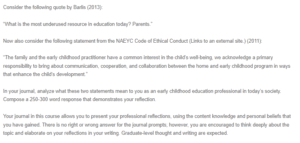Family Partnership Reflection
The statement “What is the most underused resource in education today? Parents.” means that parents are not being used to their potential in the education system. They are not being allowed to be as involved as they could be. For instance, they could be more involved in their child’s education by coming to school functions or having input in their child’s education (Barlis, 2013). Parents can also be a resource for educators by sharing their knowledge about their children with the educators. The background and experiences of the parents can help educators better understand the child. The collaboration between parents and educators can help to ensure that the child’s needs are being met and that they are receiving a quality education. However, the education system does not always make it easy for parents to be involved or to have a voice. There can be many barriers, such as lack of transportation or childcare, that prevent parents from being as involved as they would like to be. In this case, educators need to reach out to parents and make an effort to involve them in their child’s education.
The statement “The family and the early childhood practitioner have a common interest in the child’s well-being, we acknowledge a primary responsibility to bring about communication, cooperation, and collaboration between the home and early childhood program in ways that enhance the child’s development.” from the NAEYC Code of Ethical Conduct means that both parents and educators have a responsibility to work together for the benefit of the child (Feeney & Kipnis, 2011). They should communicate with each other, cooperate, and collaborate to best meet the child’s needs. The child’s interests should be the primary focus, and all decisions should be made with the child’s well-being in mind. This is not always easy to do, as there can be different perspectives on what is best for the child. However, it is important to try to see things from the other person’s perspective and come to a compromise that is in the child’s best interest. Collaborations between parents and educators can be very beneficial to the child, as long as they are done with the child’s best interests at heart. If communication and collaboration are done in a respectful and considerate way for both parties, it can be a very positive experience for everyone involved. The opportunity to learn from each other and grow as people is one of the many benefits of working together collaboratively.
References
Barlis, L. T. (2013). “I knew the right people”: A grounded theory study of the resilience of first-generation Black male college students. University of Florida.
Feeney, S., & Kipnis, K. (2011). NAEYC Code of Ethical Conduct and Statement of Commitment. Young Children, 45(1), 24-29.
ORDER A PLAGIARISM-FREE PAPER HERE
We’ll write everything from scratch
Question

Family Partnership Reflection
Consider the following quote by Barlis (2013):
“What is the most underused resource in education today? Parents.”
Now also consider the following statement from the NAEYC Code of Ethical Conduct (Links to an external site.) (2011):
“The family and the early childhood practitioner have a common interest in the child’s well-being, we acknowledge a primary responsibility to bring about communication, cooperation, and collaboration between the home and early childhood program in ways that enhance the child’s development.”
In your journal, analyze what these two statements mean to you as an early childhood education professional in today’s society. Compose a 250-300 word response that demonstrates your reflection.
Your journal in this course allows you to present your professional reflections, using the content knowledge and personal beliefs that you have gained. There is no right or wrong answer for the journal prompts; however, you are encouraged to think deeply about the topic and elaborate on your reflections in your writing. Graduate-level thought and writing are expected.

